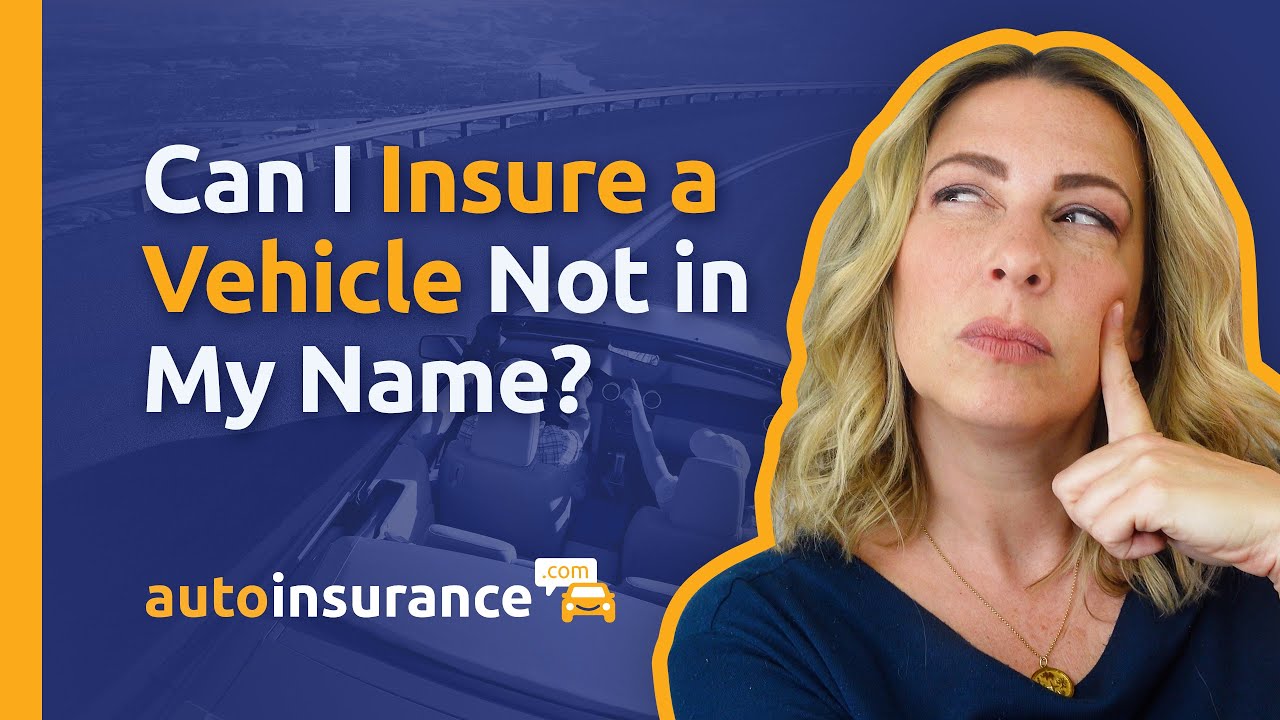Can I Insure a Car Not in My Name
Have you ever wondered if you can insure a car that isn’t in your name? Maybe you’re driving your partner’s car, or perhaps you’re borrowing a vehicle from a friend or family member. Whatever the scenario, understanding the nuances of car insurance in such situations is crucial. In this article, we’ll dive deep into the topic and uncover whether or not you can insure a car that doesn’t bear your name on the title.
Understanding Car Insurance Basics
Before we get into the specifics, let’s brush up on some car insurance basics.
Types of Car Insurance
There are several types of car insurance coverage:
- Liability Insurance: Covers damages to others if you’re at fault in an accident.
- Collision Insurance: Pays for damage to your car from a collision.
- Comprehensive Insurance: Covers non-collision-related damage to your car.
- Personal Injury Protection (PIP): Covers medical expenses for you and your passengers.
- Uninsured/Underinsured Motorist Coverage: Protects you if you’re hit by a driver with insufficient insurance.

Who Can Be Insured Under a Car Insurance Policy?
Typically, the person whose name is on the vehicle’s title is the primary policyholder. However, there are exceptions, especially if the primary driver isn’t the owner.
Insuring a Car Not in Your Name: An Overview
Insuring a car that isn’t in your name can be tricky, but it’s not impossible. Let’s explore some common scenarios and their legal implications.
Common Scenarios
- Leased or Financed Cars: Often insured by the lessee or borrower.
- Family Cars: Insured by a family member, even if not the owner.
- Business Vehicles: Insured by the business or an employee.
Legal Implications
Insurance companies require an insurable interest, meaning you must benefit from the vehicle’s protection. This can limit who can insure a car.
Can You Insure a Car Not in Your Name?
Situations Where It Is Possible
- Leased or Financed Vehicles: You can insure a car if you’re leasing or financing it since you have a vested interest.
- Family Members’ Cars: Parents can insure their children’s cars, and vice versa, as long as they share the same household.
- Business Vehicles: Employees can be listed as drivers on company-owned cars.

Situations Where It Is Not Possible
- Friend’s Car: Generally, you can’t insure a friend’s car because you don’t have an insurable interest.
- Occasional Use: If you only occasionally drive a car, it’s unlikely you’ll be able to insure it.
Scenarios Allowing Insuring a Car Not in Your Name
Insuring a Leased or Financed Car
When you lease or finance a car, the leasing company or lender retains ownership. However, as the primary driver, you need to insure it to protect both parties’ interests.
Insuring a Family Member’s Car
Family ties often allow for more flexibility. For example, parents can insure a car for their children if they live in the same household. This also applies to spouses insuring each other’s vehicles.
Insuring a Car Owned by a Business
If you drive a car owned by your employer, the business can list you as an authorized driver. This is common for company cars and commercial vehicles.
Scenarios Where It’s Not Possible
Insuring a Friend’s Car
Even if you regularly drive a friend’s car, insuring it yourself is usually not allowed. The owner should insure it and add you as a named driver.
Insuring a Car You Don’t Regularly Drive
Insurance companies typically require you to be the primary driver or at least a regular driver of the vehicle.
How to Insure a Car Not in Your Name
Steps to Take
- Consult with the Owner: Discuss insurance needs with the car’s owner.
- Contact Insurance Providers: Inquire about policies and options.
- Gather Documentation: Prepare necessary documents like the car’s title, your driving license, and proof of relationship or interest.
Required Documentation
You’ll need:
- Proof of insurable interest.
- Consent from the vehicle owner.
- Relevant identification documents.
Insurance for Different Relationships
Parent-Child Relationships
Parents can insure cars for their children, especially if they are underage or living at home.
Spousal Insurance
Spouses can insure each other’s cars, benefiting from joint policies which often offer discounts.
Business Partnerships
In a business setting, partners can insure vehicles owned by the company and assign drivers as needed.

State Regulations and Variations
How State Laws Affect Car Insurance
Insurance regulations vary by state, influencing who can insure a car and under what conditions.
Examples of State-Specific Rules
- California: Allows broader flexibility for insuring family members’ cars.
- New York: Requires proof of financial interest in the vehicle.
Alternative Options
Named Driver Policies
A named driver policy allows you to be added to the owner’s insurance without being the primary policyholder.
Non-Owner Car Insurance
This policy provides liability coverage when driving a car you don’t own.
Temporary Car Insurance
Ideal for short-term needs, this insurance covers you for a limited period, often without requiring ownership.
Benefits and Drawbacks
Pros of Insuring a Car Not in Your Name
- Flexibility: Offers coverage for those regularly driving a car they don’t own.
- Convenience: Simplifies the process for families and businesses.
Cons of Insuring a Car Not in Your Name
- Complexity: Involves more paperwork and approvals.
- Higher Costs: May incur higher premiums due to perceived risks.
Cost Implications
Factors Affecting the Cost
- Driver’s Record: A clean driving record reduces premiums.
- Car’s Value: Expensive cars cost more to insure.
- Coverage Type: Comprehensive and collision coverages increase costs.
How to Reduce Insurance Premiums
- Bundle Policies: Combine with home or other insurance types.
- Increase Deductibles: Higher deductibles lower premiums.
- Maintain a Good Driving Record: Avoid accidents and traffic violations.
Common Mistakes to Avoid
Pitfalls in the Application Process
- Incomplete Information: Providing partial information can lead to denials.
- Misunderstanding Policies: Misinterpreting coverage terms can result in gaps.
Errors That Can Lead to Claim Denials
- Non-Disclosure: Failing to disclose all drivers can invalidate claims.
- Incorrect Documentation: Inaccurate documents can cause rejections.
Expert Tips for Insuring a Car Not in Your Name
Advice from Insurance Professionals
- Consult an Agent: Professional advice can clarify complex situations.
- Review Policies Regularly: Ensure your coverage remains adequate.
Best Practices
- Document Everything: Keep thorough records of all insurance-related documents.
- Communicate Clearly: Always inform the insurance company of any changes.

Conclusion
Insuring a car not in your name can be a bit of a maze, but it’s definitely navigable with the right information and approach. From understanding the legal implications to exploring alternative insurance options, being well-informed is key. Whether you’re insuring a family member’s vehicle or navigating state-specific regulations, make sure to do your homework and consult with professionals as needed.
FAQs
Can I insure my partner’s car?
Yes, you can insure your partner’s car, especially if you live together and share driving responsibilities.
What if I’m the primary driver but not the owner?
You can often insure the car if you have an insurable interest and the owner’s consent.
Is it illegal to insure a car not in my name?
No, it’s not illegal, but it depends on the insurance company’s policies and state regulations.
Can I add someone to my policy if they don’t live with me?
This varies by insurer, but typically, non-residents can be added if they frequently drive the vehicle.
How do insurance companies verify ownership?
They check the car’s title and registration, and sometimes require additional proof like a financing agreement.